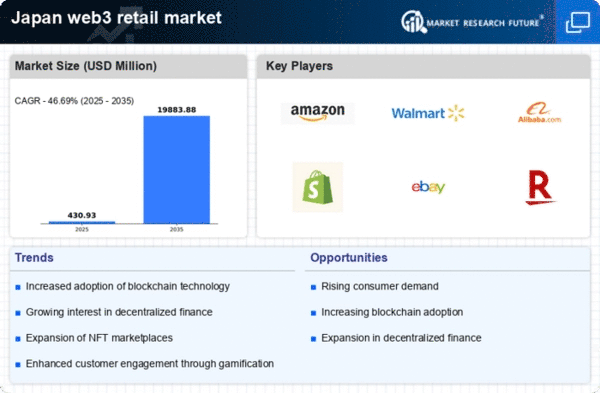Rise of Digital Wallets
The proliferation of digital wallets in Japan is a pivotal driver for the web3 in-retail market. As consumers increasingly prefer cashless transactions, the integration of blockchain technology into these wallets enhances security and transparency. Recent data indicates that approximately 70% of Japanese consumers utilize digital payment methods, which is expected to rise. This shift not only streamlines the purchasing process but also aligns with the growing demand for decentralized financial solutions. Retailers adopting web3 technologies can leverage these digital wallets to offer loyalty programs and personalized experiences, thereby fostering customer engagement. The web3 in-retail market stands to benefit significantly from this trend, as it encourages seamless transactions and builds trust among consumers.
Integration of Smart Contracts
Integrating smart contracts transforms the web3 in-retail market. These self-executing contracts, with the terms of the agreement directly written into code, streamline transactions and reduce the need for intermediaries. In Japan, the adoption of smart contracts is gaining traction, particularly in sectors such as real estate and supply chain management. It is estimated that the use of smart contracts could reduce transaction costs by up to 30%. Retailers can utilize these contracts to automate processes such as inventory management and payment settlements, enhancing operational efficiency. As the web3 in-retail market continues to mature, the reliance on smart contracts is expected to grow, offering significant advantages to early adopters.
Consumer Demand for Transparency
In the context of the web3 in-retail market, consumer demand for transparency is becoming increasingly pronounced. Japanese consumers are more informed and concerned about the origins of their products, leading to a preference for brands that provide verifiable information. Blockchain technology offers a solution by enabling retailers to trace product provenance, thereby enhancing trust. A survey revealed that over 60% of consumers in Japan are willing to pay a premium for products with transparent sourcing. This trend compels retailers to adopt web3 solutions that facilitate transparency, ultimately driving sales and customer loyalty. As the web3 in-retail market evolves, transparency will likely become a cornerstone of competitive advantage.
Focus on Sustainability Initiatives
Sustainability initiatives are increasingly influencing the web3 in-retail market in Japan. Consumers are becoming more environmentally conscious, prompting retailers to adopt sustainable practices. Blockchain technology can play a crucial role in this transition by providing transparent supply chain tracking and verifying sustainable sourcing. Recent studies indicate that around 55% of Japanese consumers prefer brands that demonstrate a commitment to sustainability. Retailers leveraging web3 solutions can effectively communicate their sustainability efforts, thereby attracting eco-conscious consumers. This alignment with consumer values not only enhances brand loyalty but also positions retailers favorably in a competitive market. As sustainability becomes a core focus, the web3 in-retail market is poised for growth.
Emergence of Decentralized Marketplaces
The emergence of decentralized marketplaces represents a significant shift in the web3 in-retail market. These platforms allow consumers to buy and sell goods directly, bypassing traditional intermediaries. In Japan, the rise of such marketplaces is fueled by a growing interest in peer-to-peer transactions and the desire for lower fees. Data suggests that decentralized marketplaces could capture a substantial share of the retail market, potentially reaching 15% by 2027. This trend empowers consumers and small businesses, fostering a more equitable retail environment. Retailers who embrace this model can tap into new customer segments and enhance their market presence. The web3 in-retail market is likely to see increased innovation as decentralized marketplaces gain popularity.

















